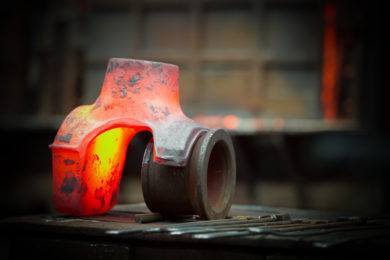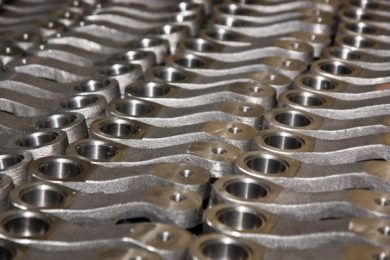There are a million reasons why we have been utilizing metal for centuries. Metal is durable, dense, relatively easy to melt and manipulate, and can be cast into an infinite number of complex shapes and sizes for purposes ranging from industrial machinery and structural components to decorative fixtures and sculpture. Metal casting involves pouring melted metals into a form or mold, which can often be reused to create multiple copies of the same part. Ordering castings from a metal foundry can not only save the time and effort required to machine and weld many replicas of the same object but can also ensure that each part is identical to the last.
There are a lot of factors to consider before ordering custom metal castings, such as design specifications (shape, quantity), application quality assurance (metal type, heat treatment, inspection), and logistics (delivery). If you don’t consider these factors, then you run the risk of purchasing castings that are ill-suited for your needs, which will result in wasted time, money, and resources.
Design Specifications

Before contacting a metal casting company or metal casting supplier, consider your metal casting needs in detail. Start by thinking about which parts you would like to cast, their shapes, dimensions, and the number of copies each part that you will need.
In metal casting, pattern making is the process through which a casting mold is developed. The developed mold is then used to cast the designed part. Molds can either be reusable or non-reusable depending on the material of the mold, which is why it’s important to decide whether you are casting a single item or whether you’ll require many replicas of that item.
Castings molds can be made from clay, sand, plastic, wood, metal as well as multiple other materials based on your casting needs. However, for most metal casting applications metal or sand molds are most common. Molds are typically developed based on a prototype, example part or a detailed schematic. It’s important to note that, because metals often shrink while cooling, the mold is usually designed to account for shape distortions that occur during cooling.
Application Quality Assurance
Aside from shape and quantity specifications, it’s also important to think about the applications for which the metal castings will be used. Application purposes can determine the type of metal used for casting and the heat treatment required to guarantee a long lifespan for your castings. There are a number of different metals to choose from for casting such as copper- and nickel-based alloys, iron, steel, and aluminum. This means you’ll also need to consider the physical properties as well as cost and aesthetics (if you are casting a decorative piece) when determining which metal is best for your part and application.
If your castings will be used in an industrial setting or exposed to extreme conditions such as hot, cold, damp environments, or under extreme weight – heat treatment may be necessary to adjust the properties of your casting prior to their application. Heat treatment involves the controlled adjustment of the temperature of a metal, which modifies the physical properties of that metal to make it more resilient in future use.
In addition to heat treatment, it is important that your castings undergo quality testing prior to use. For castings that are used solely for decorative purposes, quality testing may be as simple as checking the casting for chips and cracks. However, if the casting is to be used for industrial purposes, more extensive testing may be necessary to check physical properties (such as hardness and tensile strength) prior to use.
Logistics
Aside from design specifications and quality assurance needs, it’s also important to make sure that you can have your finished product delivered when you need it. Most likely, the metal casting company or supplier you choose to work with will run along a production schedule. Therefore, it is important to communicate with your foundry to determine lead times and pricing for the products you need.
How does General Kinematics help with custom metal castings? We supply the most innovative producers with foundry equipment to improve production and reduce scrap.We have decades of knowledge and experience to get you the best casting equipment from start to finish. Contact us today to check out your options.








